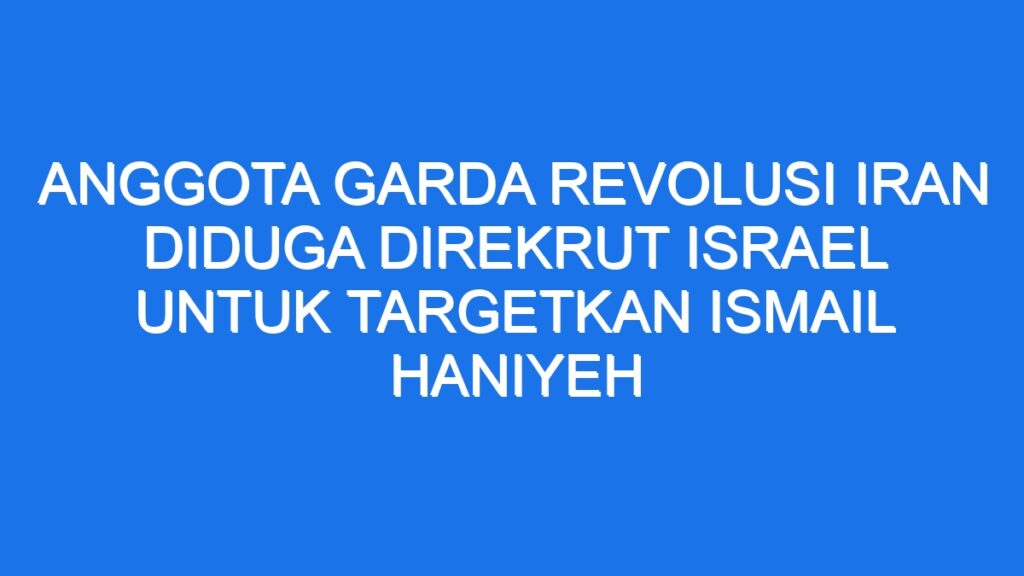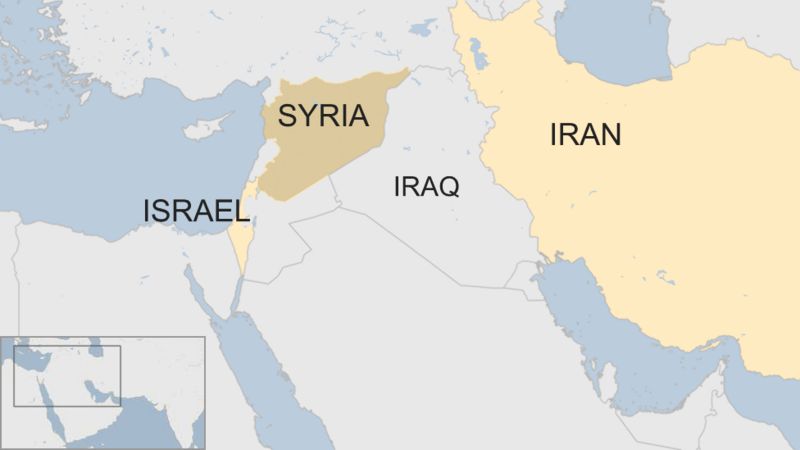Historical Tensions and Conflicts

The Israel-Iran conflict is a complex and multifaceted issue with deep historical roots. It involves a web of religious, political, and territorial disputes that have fueled animosity and mistrust between the two nations for decades.
The Role of Religion and History, Israel iran news
The historical tensions between Israel and Iran are intertwined with religious and historical factors. Both countries have strong religious identities, with Israel being home to Judaism and Iran being a predominantly Shia Muslim nation. The two faiths share a common ancestor in Abraham, but their interpretations of his legacy and subsequent history have diverged significantly, creating a religious divide.
The historical relationship between Jews and Persians is complex and has seen periods of both cooperation and conflict. While the Persian Empire historically offered refuge to Jews fleeing persecution, the relationship has been marked by periods of tension, particularly in the 20th century with the rise of Zionism and the establishment of Israel.
The 1979 Iranian Revolution and its Impact
The 1979 Iranian Revolution, which overthrew the Shah’s regime and established an Islamic Republic, profoundly impacted the relationship between Israel and Iran. The revolution led to the establishment of a government that viewed Israel as a threat and an enemy of Islam. The new Iranian leadership, led by Ayatollah Ruhollah Khomeini, openly called for Israel’s destruction and supported anti-Israel groups, further escalating tensions.
Key Events and Incidents
- The Iran-Iraq War (1980-1988): The eight-year war between Iran and Iraq, fueled by ideological and territorial disputes, further exacerbated tensions with Israel. Israel provided intelligence and limited military support to Iraq during the war, further alienating Iran.
- The 1988 Bombing of an Iranian Civilian Airliner: The downing of Iran Air Flight 655 by the USS Vincennes, a US Navy warship, in 1988 led to international condemnation and increased animosity between Iran and the US, with Israel being seen as an ally of the US.
- The 2010 Stuxnet Cyberattack: The Stuxnet cyberattack, widely attributed to a joint US-Israeli operation, targeted Iran’s nuclear program. The attack, which damaged centrifuges at Iran’s Natanz nuclear facility, heightened tensions and signaled a new dimension in the conflict.
Nuclear Program and Sanctions

The relationship between Israel and Iran has been characterized by a long-standing and complex history of tensions, often fueled by conflicting geopolitical interests and ideological differences. A key element in this fraught relationship is the issue of Iran’s nuclear program, which has been a source of significant international concern for decades.
Iran’s Nuclear Program
Iran’s nuclear program has been a source of global controversy since the 1970s, with the international community expressing deep concerns about its potential military applications. While Iran maintains that its nuclear program is solely for peaceful purposes, such as energy generation and medical research, the international community remains skeptical, particularly given Iran’s history of secrecy and its refusal to fully cooperate with international inspections.
Impact of Sanctions
International sanctions, imposed by the United Nations, the United States, and the European Union, have significantly impacted Iran’s economy. These sanctions target various sectors, including oil exports, banking, and financial transactions. The aim is to pressure Iran to halt its nuclear program and comply with international demands. While the sanctions have had a significant impact on Iran’s economy, they have also had a mixed impact on its nuclear ambitions.
“The sanctions have made it more difficult for Iran to acquire the materials and technology it needs for its nuclear program, but they have not stopped it entirely.”
While the sanctions have slowed Iran’s nuclear program, they have not completely stopped it. Iran has continued to develop its nuclear capabilities, albeit at a slower pace. This has led to a stalemate, with Iran refusing to abandon its nuclear program and the international community continuing to impose sanctions.
Israel’s Position
Israel views Iran’s nuclear program as an existential threat, arguing that a nuclear-armed Iran would pose a serious danger to its security and regional stability. Israel has consistently advocated for a firm stance against Iran’s nuclear ambitions and has even threatened military action if necessary. Israel’s position is rooted in its belief that Iran’s nuclear program is not for peaceful purposes but is ultimately aimed at developing nuclear weapons.
International Community’s Position
The international community, while concerned about Iran’s nuclear program, has taken a more nuanced approach. While many countries share Israel’s concerns about Iran’s nuclear ambitions, they also recognize the importance of diplomacy and international cooperation in addressing the issue. The international community has sought to negotiate a comprehensive agreement with Iran that would address its nuclear program and ensure its peaceful nature. The Joint Comprehensive Plan of Action (JCPOA), signed in 2015, was a major diplomatic achievement, but it faced challenges, including the US withdrawal in 2018.
Comparison and Contrast
The positions of Israel and the international community on Iran’s nuclear program differ significantly. Israel has taken a more hawkish stance, advocating for a hard line and even threatening military action. The international community, while concerned, has sought a more diplomatic approach, prioritizing negotiations and international cooperation. The differences in perspective stem from differing assessments of the threat posed by Iran’s nuclear program and the best way to address it.
Regional Dynamics and Proxy Conflicts: Israel Iran News

The complex relationship between Israel and Iran extends beyond their direct interactions, encompassing a web of regional conflicts and alliances. Both countries actively engage in proxy conflicts, supporting various groups and militias across the Middle East, contributing to instability and exacerbating tensions.
Role in Regional Conflicts
Israel and Iran have been deeply involved in regional conflicts, particularly in Syria and Lebanon. Their involvement has often been characterized by indirect support for opposing factions, contributing to the complexities and protracted nature of these conflicts.
Syrian Civil War
Israel has been a vocal critic of the Syrian government and has provided support to various Syrian opposition groups. This support has included providing intelligence, training, and limited military aid. On the other hand, Iran has been a staunch supporter of the Syrian government, providing significant financial and military assistance. This support has been instrumental in helping the Syrian government maintain control over key areas and suppress rebel groups.
Lebanese Civil War
Israel and Iran have also been involved in the Lebanese Civil War, albeit to a lesser extent. Israel has been a long-standing supporter of the Lebanese Christian Maronite community, while Iran has supported Hezbollah, a Shia militia with close ties to Iran. The Lebanese Civil War ended in 1990, but the influence of both countries continues to be felt in Lebanese politics and society.
Proxy Groups and Militias
Both Israel and Iran have a network of proxy groups and militias that they support in the region. These groups act as extensions of their respective policies, carrying out operations and influencing regional dynamics.
Israel-backed Groups
Israel has supported various groups in the region, including:
- Lebanese Forces: A Christian militia that played a significant role in the Lebanese Civil War. They have received support from Israel in the past, although their relationship has been strained in recent years.
- South Lebanon Army (SLA): A Christian militia that was active in southern Lebanon during the Israeli occupation. The SLA received extensive support from Israel, but it was disbanded after the Israeli withdrawal in 2000.
- Syrian opposition groups: Israel has provided support to various Syrian opposition groups, including some that are fighting against both the Syrian government and Iranian-backed forces.
Iran-backed Groups
Iran has supported various groups in the region, including:
- Hezbollah: A Shia militia based in Lebanon, Hezbollah has received significant financial and military support from Iran. It has been involved in numerous conflicts, including the 2006 Lebanon War and the Syrian Civil War.
- Houthi rebels in Yemen: The Houthis are a Shia rebel group that has been fighting against the Yemeni government. Iran has provided significant support to the Houthis, including weapons and financial aid.
- Shia militias in Iraq: Iran has supported various Shia militias in Iraq, including the Popular Mobilization Forces (PMF), which played a significant role in the fight against ISIS.
Regional Allies of Israel and Iran
The regional dynamics are further complicated by the alliances that Israel and Iran have forged with other countries in the region.
| Country | Israel’s Allies | Iran’s Allies |
|---|---|---|
| Egypt | Yes | No |
| Jordan | Yes | No |
| Saudi Arabia | Yes | No |
| United Arab Emirates (UAE) | Yes | No |
| Bahrain | Yes | No |
| Syria | No | Yes |
| Lebanon | No | Yes |
| Iraq | No | Yes |
| Yemen | No | Yes |
